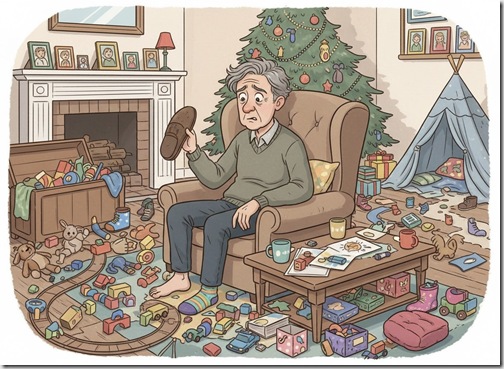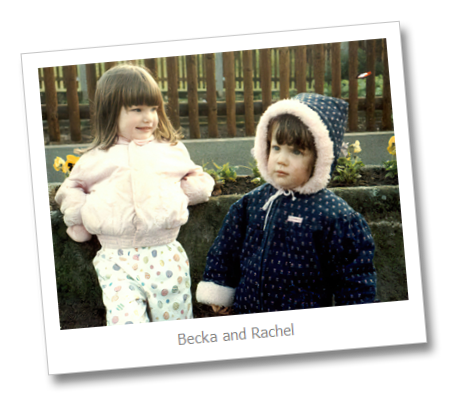Post-Thanksgiving Entertainment
02 December 2025 • by Bob • Humor, Family
Now that the Thanksgiving holiday has ended,
the kids and grandkids have all gone home,
and I must begin the long and arduous task of discovering
where the toddlers have hidden all my shoes.
Louis McMurray (1940 - 2024)
12 October 2024 • by Bob • Family
My heart has been shattered into a million tiny pieces, and I have wept more tears than I thought I could carry; my keeper, my mentor, my father, and my friend has left this life, and the world is a profoundly poorer place in his absence. ![]()

Please forgive my brief rambling... I'm just a fatherless son who's aimlessly adrift between the "bargaining" and "depression" stages of grief.
Oh, and f*ck cancer.
Standing Up to Bullies
12 September 2022 • by Bob • Family, Parenting
In 1990, my wife and I were stationed in Germany with our daughters, Becka and Rachel, who were 5 and 3 years old respectively. Our two girls would play in the back yard behind our apartment, but every once in a while, the little boy across the street would come over and yell at Rachel to make her cry. Whenever my wife or I would run outside to see what was happening, the little boy would be trotting gleefully back across the street to his parents, who would pick him up and look at my wife and me with a shrug of their shoulders and a patronizing half-smile as if to say, "Boys will be boys." Their son was an only child, and he was quite clearly a spoiled brat.
I sat Rachel down one day when she was crying after the little boy's last attack, and I explained that the boy was a bully. I told Rachel that when he came over the next time, she needed to jump up and scream in his face as loudly as possible before he had a chance to do anything. Sure enough, a few days later we heard Rachel screaming at the top of her lungs, and we ran outside to see the little boy crying and running home to his parents, who were eyeing Kathleen and me with a look of horror on their faces. I gave them a sarcastic half-smile and shrugged my shoulders as if to say, "Girls will be girls."
But the best part was Rachel's reaction; as she watched that bawling brat run home to safety, her face was aglow with a combination of shocked surprise and total elation. She turned to look at me and said, "I did it! I yelled at him and he ran away!" At that moment, I realized that my daughter would never fall victim to a bully ever again. I may have taught her how to stand up to our neighbor's bratty kid, but she had won this battle entirely on her own. She was empowered.
POSTSCRIPT:
I should add, however, that the spoiled, little brat briefly paused in his withdrawal to look back at Rachel, who made her point undeniably by unleashing another round of high-powered war cries, and the sniveling little coward made good on his retreat and vanished into the safety of his home. He never bothered Rachel again.
Sometimes It's Better Not to Chase Your Dreams
17 October 2019 • by Bob • Ponderings, Music, Family
A friend of mine recently posted the following quotation from G. K. Chesterton, which caused me to step back for a moment and reflect on some recent discussions about how my life turned out...
Just a brief bit of honesty - I played guitar for several bands in my younger days, and I was particularly obsessed with "making it" as far as that industry was concerned. I focused on performance, songwriting, technical skill, etc., and I had a STRICT no drugs/alcohol policy; those things ruined musicianship and relationships, and unless you could be totally sold out for music, then you didn't belong. In short, anyone who wasn't as 110% passionate about being a success got booted from my band. I abandoned that form of obsessive pursuit when I became a Christian, and I briefly played in couple Christian bands before I eventually gave it all up and joined the Army.
A lot of time has passed since then, and my wife was recently commenting that it's too bad that I didn't have my "chance" to become a successful musician when I was younger, for I am admittedly far too old to be packing up a guitar and headed out on career-starting tour. I countered her condolences with the following self-observation...
No, it's a great thing that I didn't chase my "dream." The entertainment industry ruins people, as Hunter S. Thompson once observed, "The music business is a cruel and shallow money trench, a long plastic hallway where thieves and pimps run free, and good men die like dogs. There's also a negative side."
I have no misconceptions that I would have failed miserably as a human being the closer I got to "success" in worldly terms. Sure, I may have continued to avoid drugs and alcohol, but that doesn't mean I wouldn't have succumbed to other vices - perhaps something seemingly acceptable as materialism. (e.g. I still own 20+ guitars.)
But the pursuit of success - at least in the way that my brain was wired to pursue it - was a form of idolatry, and I have no misconceptions about that. Even in the Christian music business, most people get destroyed by the industry. So I have no illusions about missing my "chance" when I was younger. I became a husband, and a dad, and more importantly a decent human being; those are far better legacies in my estimation. Don't get me wrong, there are a handful of people who can balance "success" and basic human decency, but tens of thousands of people cannot do so, and I'm one of them.
Adventures with the Easter Vampire
30 March 2018 • by Bob • Family, Humor
A few years ago I wrote a blog titled "Adventures with the Tooth Werewolf", where I wrote about how I rose my children with a belief in the Tooth Werewolf instead of the Tooth Fairy. In that same blog I also briefly mentioned that I had come up with the Easter Vampire instead of the Easter Bunny. (I'll bet you wish your parents had been this cool, right?)
That being said, one of my daughters sent me the following video, which she appropriately-labeled, "The Easter Vampire?"
![]()
Forgiveness and Restoration
19 July 2017 • by bob • Family
I stumbled across the following article recently, which briefly discusses an issue that our family has struggled with:
How to Forgive When It's Hard to Forget
Without going into too much detail, someone in our family hurt my children; and by that I mean this person really hurt my children - in life-altering ways. When someone injures your children, you want that person to be punished; you want them to suffer for the years of pain your children have had to endure. And yet for reasons I cannot explain, this person has never faced justice. We cut this person out of our lives as you would with any other cancer, but unfortunately that is the most that we can do.
That being said, our family is predominantly populated with Christians who want everyone and everything to be "forgiven," and for all of us to get along as one big, happy family. However, since the person who caused all of this pain and suffering has never changed, any semblance of restoration is probably never going to happen, for reasons that should be obvious to anyone who loves their children. But seeing as how it was only my children who were hurt, my wife and I have received countless comments from other family members asking whether we have "forgiven" the pernicious person who is the source of our family troubles. We have assured everyone that we have, which then leads to the questions about why can't our "lives go back to the way they were before all of this started."
First of all, the way our lives were before "all of this started" does not mean that the guilty party wasn't hurting other people; it was just happening to people outside our immediate family, and being swept under the rug because people chose not to see that it was happening. But that is a different problem for a different day.
The problem that currently faces our family is: what does it mean to forgive someone?
For some of our family members, "forgiveness" means a complete and total restoration. But that is a totally naïve sentiment, and it completely ignores or trivializes the suffering of those whose lives were damaged. My wife and I have tried to explain time and again that we have "forgiven" the person who wounded our family, but we have no desire to rekindle a relationship with the guilty party. To other family members this looks like "unforgiveness," whereas to me this looks like "common sense." One should not willingly subject their loved ones to a harmful person in the name of "forgiveness."
This is why I enjoyed the article that I mentioned earlier; in that piece, Dr. Cloud did a great job of summarizing the different parts of a restoration process, which I will paraphrase and adapt to our family's situation:
Forgiveness: This is letting go of what you believe is your right to punish someone for how they hurt you. My wife and I have done so; it was difficult, but holding onto unforgiveness is more harmful to yourself than it is to others. Or as a popular idiom states, "Holding on to unforgiveness is like drinking poison and expecting the other person to die."
Reconciliation: This is when the other person apologizes and accepts forgiveness; this has not happened within our family. In fact, the guilty party is still asserting that he or she has never done anything wrong, and recently demanded an apology for the years that he or she was denied access to our family. With this person's attitudes in mind, any hope of reconciliation is currently impossible.
Trust: This is when you allow a person whom you have forgiven back into your life. This may be a long, slow process, because it involves re-establishing your confidence that the person who hurt you will not do so again. In our family's situation, the person responsible for all of the suffering still insists no wrong-doing, so there can be no reasonable assumption that this person will not hurt someone again. Perhaps he or she will not wound someone in the same way as before, but still - I do not trust this person around my spouse or children.
Bringing this discussion to a close, we need to make a clear distinction between "forgiveness" and "reconciliation" in our lives. When we confuse these actions, we may subject ourselves to further injury. We certainly need to forgive those who harm us, but it is up to the other person to reconcile the situation and to re-establish trust. If the other person is unwilling to do so, then you are far better off without them in your life.
By the way, the following book by Jerry Cook is a good resource for anyone who is faced with difficult life situations and questions about forgiveness:
Love, Acceptance and Forgiveness: Being Christian in a Non-Christian World
UPDATE:
This blog originally pointed to the article How to Extend Forgiveness and Set a Boundary, but that article has been removed from Dr. Cloud's website and the Internet Archive does not have a cached version, so I replaced it with the article you now see.
Painful Childhood Memories
11 January 2017 • by bob • Humor, Family
Okay, I have a confession to make - when I was very young, and by that I mean several months younger than the age of two, I was traumatized by the letter "Z."
Now I know what you're thinking; and it sounds ridiculous, right? But I knew that the letter "Z" was out to get me - and I had proof.
First of all, I was convinced that the letter "Z" was a real, live animal. And I knew this for a fact because I had learned that on Sesame Street. Here is living proof:
You can see my point, can't you? The letter "Z" obviously had a mind of its own; it had an attitude, it was reckless and passive aggressive, and it seemed to bring out the worst in Kermit the Frog. There was no mistake about it in my mind: the letter "Z" was a nasty character, and it was something which I wanted nothing to do with.
And yet, the letter "Z" had somehow followed me home, and it was living in my backyard. I saw it there - every day - lurking just outside the sliding glass door, and watching my every move.
But what was even more unsettling for me was the fact that my parents, who were supposed to love me, would plop me down in my high chair and turn it so that I was facing outside. And there I would sit, staring at my nemesis, who wouldn't move an inch. The letter "Z" was sizing me up, and I knew that it was waiting to see if I would fall asleep in my high chair... and then it would attack. So I kept my eyes open, and I never took naps in that house. Oh sure, that meant that I was cranky toddler, but that wasn't my fault; I was a victim of my circumstances, and my parents needed to pay for their transgressions.
Thankfully, I no longer live in that house. Our family moved, and the letter "Z" did not appear to have followed us. But I remember vividly what that terrifying scene looked like every day, and here is my feeble attempt at an artist's rendition...
You can say what you want, but I'm telling you the truth - that letter "Z" was out there; and somewhere in the back of my mind, I'm sure that it still is.
The Importance of an Apology
23 April 2016 • by bob • Family, Marriage
A friend of mine recently shared the following article on Facebook about a study that was just published by Dr. Roy Lewicki and others at the University of Ohio on the subject of what constitutes an effective apology:
The Six elements of an Effective Apology, According to Science
While the information contained in Dr. Lewicki's study is certainly relevant, it is more or less a rehash of the material which Dr. Gary Chapman presented in his book The Five Languages of Apology: How to Experience Healing in All Your Relationships, which was published ten years ago.
Five of the six points in the OSU study's "new research" are directly lifted from Dr. Chapman's points - and they are almost verbatim quotes. To show just how closely Dr. Lewicki's points are to Dr. Chapman's, I will present the OSU study's list in the first column below, and then I will present the matching points from Dr. Chapman's book in the second column:
| OSU Study | Dr. Chapman's Book |
|---|---|
| 1. Expression of Regret | 1. Expressing Regret |
| 2. Explanation of What Went Wrong | n/a |
| 3. Acknowledgment of Responsibility | 2. Accepting Responsibility |
| 4. Declaration of Repentance | 4. Genuinely Repenting |
| 5. Offer of Repair | 3. Making Restitution |
| 6. Request for Forgiveness | 5. Requesting Forgiveness |
That being said, the OSU study ultimately draws the wrong conclusions; the OSU study suggests that there is one formula for apologies which works in all situations, whereas Dr. Chapman's book demonstrates that what is most-important in an apology for one person may not be for another.
For example, taking responsibility is of paramount importance to me, but not so much for my spouse. However, requesting forgiveness is extremely important for her, and yet Dr. Lewicki suggested that you could leave out the request for forgiveness entirely. If my wife and I were to follow the OSU study's recommendations, she and I would be apologizing to each other in ways that do not align with the other's communication needs, which will undoubtedly result in additional strife at a time when effective communication is most critical.
In contrast to the OSU study's conclusions, Dr. Chapman's recommendation is that each partner in a relationship learn their partner's expected form of apology and strive to address their partner's needs when expressing their apologies. Attempting to pigeon-hole the communication requirements for every relationship based on a single formula as the OSU study suggests is ludicrous.
So ultimately the OSU study is heavily plagiarized from Dr. Chapman's pre-existing research, and yet that study still manages to arrive at an incorrect outcome.
Too Cool for School
01 February 2016 • by bob • Family, Humor
I just re-discovered this story: my son was a senior in high school when he flew to San Francisco on a choir trip. And even though his flight was leaving Seattle around the same time as a flight which I was taking somewhere else, he didn't want to ride to the airport with me. His exact words were, "I'd rather go with people that I can talk to." (This is a teenage way of saying that I was just not cool enough to be part of his entourage.)
However, after I had arrived at the airport and was calmly waiting for my flight to depart, my wife called to tell me that our son realized when he arrived at the airport that he had left his boarding pass and all of his money for the trip at home. I called my son, who informed me that he had already picked up a new boarding pass from the airline, but he didn't have a way to get the money from home. Feeling sorry for him and ignoring his earlier diss about the ride, I agreed to drop by an ATM and pick up some cash to give my son at his gate, which was in a different terminal of the SEATAC airport.
After finding the nearest ATM and withdrawing the requisite funds, I headed off to catch the airport tram to the terminal where my son was waiting for me. I was already en-route to his location when a thought suddenly dawned on me: why in the world was I hand-carrying the cash all the way to his gate, when he was the one who had forgotten everything?
Once that notion had registered completely in my mind, I called my son and told him to walk to the tram station in his terminal and meet me there. As the tram pulled into the stop near his gate, I saw my son and one of his friends waiting patiently for me to arrive. I hopped off the tram, gave my son the cash, took a quick photo of him, and then hopped back on the tram before the doors were able to close - mission accomplished.

In the end I may have saved the day, but I still wasn't cool enough to give my son a ride to the airport.
Technology in the Home
21 January 2016 • by bob • Family, Computers, Humor
Finally a book comes out that would have helped my children understand part of their childhood.. ![]()





